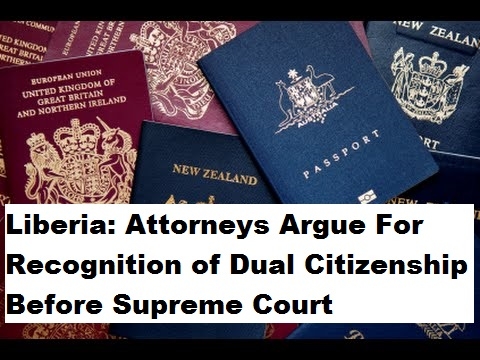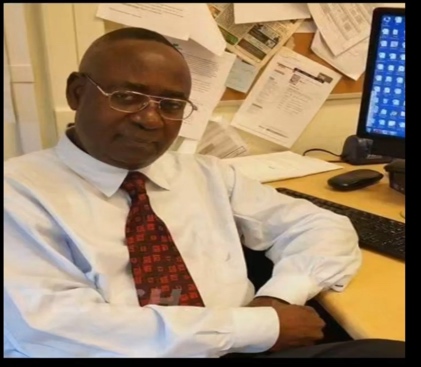Liberia: Attorneys Argue For Recognition of Dual Citizenship Before Supreme Court
Lead Attorneys for the initiative to recognize dual citizenship of Liberians are scheduled to appear before the Justices of the Supreme Court of Liberia on Wednesday, May 10, 2017 to begin procedural hearing into their petition.
According to Mr. Cyrus Gray, a Liberian lawyer, author and Maritime expert based in Houston, Texas, the initiative which is supported by the Union of Liberian Associations in the Americas – an umbrella organization of Liberian civic organizations in the United States and Canada, is an attempt to resolve the lingering issue of disenfranchisement of Liberians who have taken up citizenship in other countries.
Mr. Gray is one of several Liberians and organizations in the U.S. who is spearheading global activism on the issue.
At issue is chapter 22 of the 1974 amended Alien and Nationality Law of Liberia which details acts under which a Liberian may lose citizenship:
“22.1. Acts causing loss of citizenship.
From and after the effective date of this title, a person who is a citizen of Liberia whether by birth or naturalization, shall lose his citizenship by (a) Obtaining naturalization in a foreign state upon his own application, upon the application of a duly authorized agent, or through the naturalization of a parent having legal custody of such person; provided that citizenship shall not be lost by any person under this section as the result of the naturalization of a parent or parents while such person under the age of 21 years, unless such person shall fail to enter Liberia to establish a permanent residence prior to his twenty-third birthday; or
(b) Taking an oath or making an affirmation or other formal declaration of allegiance to a foreign state or a political subdivision thereof; or (c) Exercising a free choice to enter or serve in the armed forces of a foreign state, unless, prior to such entry or service, such entry or service is specifically authorized by the President;
(d) Voting in a political election in a foreign state or voting in an election or plebiscite to determine the sovereignty of a foreign state over foreign territory; or (e) Making a formal renunciation of Liberian nationality before a diplomatic or consular officer of Liberia in a foreign state in such form may be prescribed by the Secretary of State.
§ 22.2. Citizenship lost solely from performance of act.
The loss of citizenship under Section 22.1. of this title shall result solely from the performance by a citizen of the acts or fulfillment of the conditions specified in such section, and without the institution by the Government of any proceedings to nullify or cancel such citizenship…”
Attorneys led by Counselor Alvin Teage Jalloh will argue to the Liberian justices that the chapter 22 clauses of the Alien and Nationality Law contravenes Article 20 Constitutional provision of due process. Presently, as written, the loss of citizenship is automatic based on the commission of the acts mentioned in chapter 22 of the law.
In 2010, the current Chairman of Liberia’s National Elections Commission who is overseeing the conduct of the 2017 Presidential and General Elections Mr. Jerome Kokoyah was a lead advocate in the effort to get recognition of dual citizenship. Mr. Kokoyah, has, in recent times, come under accusation that he holds dual Liberian and American citizenships; a charge he has denied.
The NEC Chairman is being sued by Counselors Laveli Supuwood and Tiawon Gongloe in an effort to force him to disclose his citizenship status.
In 2011 a group of Liberians in Minnesota launched a 10,000-signature petition drive to urge the Sirleaf Administration and the national Legislature to recognize dual citizenship. President Sirleaf has announced her support for dual citizenship.
Several individuals and organizations have argued in support of the petition. Under its Rule of Law Initiative, the American Bar Association (ABC) issued an analytical report in 2009 and made several recommendations to modernize the Liberian Alien and Nationality Law to include the following:
…Permit dual citizenship for persons of Liberian descent born or residing outside Liberia, in order to encourage a return of the diaspora;
Allow naturalized citizens to reside or own property abroad without losing their Liberian
citizenship;
Permit Liberians who are naturalized in another state to maintain their Liberian citizenship.
Mr. Edmund Bargblor, a Liberian educator and community influencer based in Rhode Island, in a recently published opinion article entitled “Have Liberians With Dual Citizenship Become De Facto Second Class Citizens In Their Own Country Of Birth?” argued that “…Liberians in the Diaspora have the necessary academic and professional preparations, to help Liberia solve her problem of brain drains. The government of Liberia needs to encourage all its nationals to return home. Closing the doors on others, due to their dual citizenship status is not in the best interest of the socio-economic development of the nation. Other countries in Africa, Ghana for example, are increasingly engaged in strategies and programs to reverse the brain drain to retain skilled professionals at home. Perhaps, Liberia’s lawmakers need to understand and emulate the wisdom of Ghana, Nigeria and other countries within the sub-region and encourage dual citizenship participations at all levels of the Liberian Government…”
Mr. Bargblor further held that “…Consequently, Liberians with dual citizen status, have become de facto second class citizens in the land of their forefathers. The prevention of Liberians with dual nationalities from enjoying the full benefits of their nation is not only in direct contravention of the equal protection clause of the Liberian constitution that extends equality of opportunity for all citizens without discrimination, but also in contravention of UN Declaration of Human Rights…”
A Liberian based attorney Wonderr K. Freeman, in an article published on April 17, 2017 on the GNN news website notes that “…This is an undisputed fact. To develop, we need more talented people, more industrious people and more people with the capacity and desire to invest and develop Liberia. The sooner we scrapped all these citizenship bans, and replace them with sensible pro-business laws, the better we will all be. That’s why I’m in favor of changing our laws to permit both dual citizenship and non-negroes citizenship…”
In his opposition argument against recognition of dual citizenship, one Mr. Cecil Franweah Frank wrote on the Perspective online web portal in December, 2012 that “…Passing a dual citizenship law in Liberia will be like putting the cart before the horse. The current draft dual citizenship bill just like the 1986 Constitution and the 1973 Alien and Nationality Law before it has not adequately addressed the host of legal and political issues pertaining to dual citizenship, including such issues as eligibility of dual citizens for public office, taxation, national cohesiveness, and insulating the country from potential foreign allegiance. Moreover, by removing all conditions for the loss of citizenship by “natural born” Liberians as proposed by the authors of the draft law and retaining those very provisions for only naturalized Liberians, this might set a troubling standard of discrimination that already exist in our current laws regarding the eligibility for citizenship and trample the rights of Liberian women that have children with foreign citizens by not allowing their children to become citizens. These are issues that need to be addressed first before even contemplating a dual citizenship law. By canceling provisions on loss of citizenship contained in Chapter 22 of Section 22.1 of the Alien and Nationality Law, particularly such provisions as naturalization in a foreign state or service in foreign armed forces will further solidify Liberia’s banana republic status and expose Liberian citizenship to potential abuse…”
About 23 African countries including Sierra Leone and Nigeria recognize dual citizenship of their nationals.
Mr. Gray says that it is critical that, as attorneys, argue the case before the Supreme Court, strategic awareness be maintained.
Following the procedural and pre-trial hearing, substantive legal arguments will follow in the coming weeks. The Supreme Court will subsequently issue a ruling.
In an online national teleconference held on Sunday, May 7, 2017, Liberians who called in from the UK, Monrovia, Australia and several states in the U.S. expressed overwhelming support for the recognition of dual citizenship by the Liberian government. Liberians in the Diaspora remit personal remittances to family members back in Liberia.
The World Bank quoting IMF data notes that personal remittances in USD of Liberians to family members in Liberia since 2011 are as follows:
2011 – $360 million USD
2012 – $516 million USD
2013 – $383 million USD
2014 – $506 million USD and
2015 – $641 million USD
By Emmanuel Abalo
Philadelphia, PA USA







